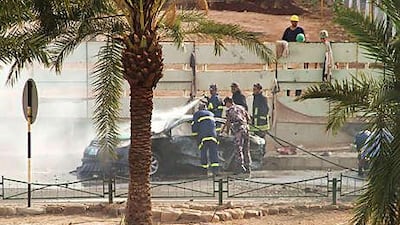CAIRO // As Jordan and Israel closed ranks yesterday around undisclosed "proof" that a deadly rocket salvo this week originated in Egypt's Sinai Peninsula, Egypt's government continued to peddle its increasingly shaky defence: that its airtight control of the remote, restive Sinai would never permit such an attack.
Monday's missile barrage, which killed one man in Aqaba but missed its suspected target in the Israeli resort town of Eilat, is the second rocket attack believed to have come from the Sinai in the past four months. Mohammed Ali Bilal, a former major in the Egyptian army and a First Gulf War veteran who now works as an independent security consultant, echoed the official view yesterday. "The Egyptian security forces are patrolling this whole area day and night, so it's impossible for rocket launch-pads to pass through north Sinai without being identified by Egyptian security," said Major Bilal, suggesting instead that the rockets were likely fired by Palestinian militants from Jordan's western desert region.
Despite what appears to be an emerging pattern of belligerence in Egypt's Sinai Peninsula, a sparsely-populated region of deserts and mountains that shares borders with Israel and the Palestinian territory of the Gaza Strip, analysts said the attacks were unlikely to threaten Israel's close relationship with Egypt, one of its few partners in the Middle East. At stake in the dispute is whether Egypt's security forces can be trusted to police their own wild East - a region where borders are so porous and international treaties so sensitive that even the second missile attack in four months has done little to raise diplomatic hackles in one of the region's oldest powder-kegs.
"Israel and Egypt, both of them, are keen on keeping peace between them. Israel is not seeking any escalation with Egypt because they have many hostilities with other neighbours," said Bashir Abdel Fattah, an expert on the Sinai Bedouin at the semi-official Al Ahram Centre for Political and Strategic Studies in Cairo. "It is for the sake of Israel to keep peace with Egypt, not to escalate with Egypt. The Israeli authorities know well that the Egyptian authorities are not responsible for the tensions in Sinai."
While the attacks may do little to threaten the diplomatic marriage of convenience between Egypt and the Jewish state, they could add a new wrinkle to the ongoing conflict between the Sinai Peninsula's impoverished Bedouin community and the Egyptian government. Egypt's vast internal security apparatus has long viewed the Sinai, with its isolated, heavily armed and politically disenfranchised population, as a liability. Many Bedouin admit to smuggling drugs, weapons and other contraband across Egypt's borders with Israel and the Gaza Strip.
But if Bedouins disobey the law, it is because the government treats them as pariahs by ignoring their pleas for economic development and more jobs, said Sheikh Mousa al Minayai, the lead of the al Minayai clan in northern Sinai. "Sinai Bedouins always ask for development in Sinai, but there is no development," said Mr al Minayai. "So if there is no development, such people have no other outlet except dealing with smuggling."
But Egypt's interior ministry also points to past attacks in the Sinai against tourists in 2004, 2005 and 2006 as evidence that some Bedouin collude with Palestinian militants and radical Islamist groups. Bedouin leaders attribute the rising tensions to Egypt's security forces, who run roughshod over the Bedouin's fierce sense of privacy and independence while using heavy-handed and unlawful policing methods to subjugate them.
In the past month, Egyptian law enforcement have released several hundred Bedouin men, many of whom were being held indefinitely under the terms of Egypt's 30-year-old emergency law. Among those released was Mosaad Abu Fajr, a Bedouin blogger who served nearly three years in prison based on government accusations - but never formal charges - that his writing had "incited" violence against the state.
"Sinai people would never do this," said Mr Abu Fajr of the five rockets that were reportedly fired on Monday, which he said were designed by elements within Egypt's security forces to impugn the Bedouins and scuttle their reconciliation with the government. "Even if a person from Sinai committed such an act, it was by people who came from outside the Sinai, not originating from Sinai. I was in the Sinai yesterday and people were really unhappy about what happened."
In the weeks before the government began releasing detained Bedouins last month, the peninsula had edged toward a full-on guerrilla war. Tit-for-tat violence between Egypt's state security and Bedouin tribesmen, who were furious about the police's tendency to "kidnap" fugitives' close relatives for use as hostages, culminated in an attack on a natural gas pipeline between Egypt and Syria and Jordan in late June.
Yet as violent as that episode was, the Bedouin limited their attacks to Egyptian government targets. The rocket attacks against Israel, said Mr Abdel Fattah, was more likely launched by Palestinian militants, such as Hamas, with limited assistance from Bedouin tribes. The ostensible aim of such an attack would be to halt direct talks between Israel and the Palestinian National Authority, he said.
Nevertheless, Egypt's government will probably tread lightly with the Bedouin, whose sensitive geographic position on the border with Israel makes them a particularly unwieldy, potentially destabilising force. "The Egyptian government is trying her best to put an end to the tensions between the government and the Bedouins," Mr Abdel Fattah said. "It is for the sake of the Egyptian security and all of Egypt to reconcile with the Bedouins and put an end to this tension with them."
mbradley@thenational.ae

